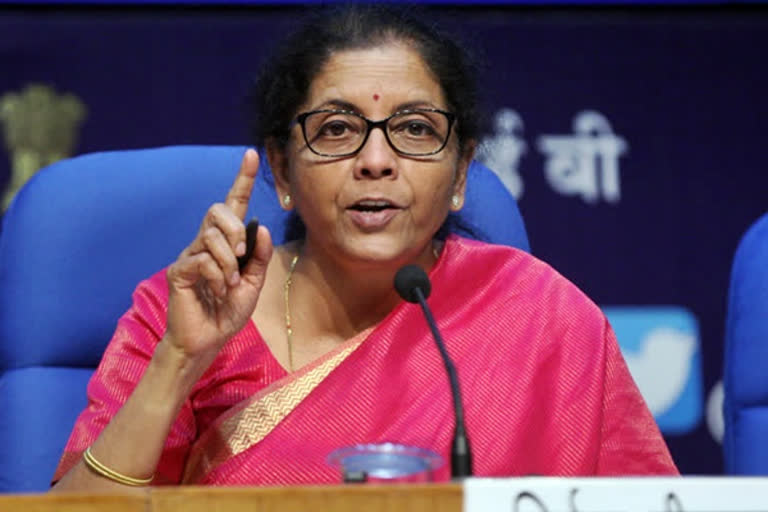New Delhi: Finance minister Nirmala Sitharaman has clearly cut out her task for the first post-pandemic budget as she gears up to present a ‘budget like never before in the last 100 years’ at a time when the country is in the process of stepping out of the shadows of the Covid-19 global pandemic. Addressing a conference organised by the industry body CII, Sitharaman Friday outlined the government’s focus on the health sector, more thrust on digitalisation and infrastructure and job creation for the post-pandemic era.
“Health takes top priority. Health and investment in health is going to be critical not just to keep our lives safer but also to make health and health expenditure more predictable so that people don’t have to do it out of pocket, some kind of provisions will be made for that,” said the finance minister.
Sitharaman said with the rollout of the vaccination programmes, countries are stepping out into the post-pandemic era.
The outbreak of the Covid-19 global pandemic, which has killed over 1.68 million people worldwide and over 1,45,000 people in the country in less than a year, has brought the issue of poor health infrastructure in the country to the centre stage of the economic debate. The country faced a shortage of medicines, face masks, protective gears and critical equipment like ventilators during the early months of the outbreak which forced the government to even convert railway coaches into Covid treatment facilities.
While emphasising on the need to master fields like telemedicine, the finance minister said there was a need to create soft capacities like doctors, nurses, paramedics who can care for patients through telemedicine.
Sitharaman said there is a need to build more hospitals, not just the buildings of the hospitals but also the necessary capacity for the benefit of the people.
“I'm keen to say that we will be taking all the inputs that the health sector has given us for good consideration in the budget,” she assured the industry participants.
Job creation
Talking about the need to create jobs in the post-pandemic era, the finance minister said livelihoods is going to be a new canvas in the post-pandemic era.
“Whether it is medium, large or small industries, the way the jobs are designed to be created itself will go through a massive change,” she observed.
The finance minister said it was both a blessing and responsibility to train and provide employment to India’s youth as in some years 60% of the country’s population will be under the age of 30.
“We will have to provide them with the right kind of vocational skills and skills also for them to be ready for future jobs and the jobs themselves need to be defined better,” she said.
Sitharaman, who is the first full-time women finance minister, underscored the need for increasing women participation in the workforce.
We need more women in the boards, more women in work participation, she said.
Focus on both rural, urban centres
Talking about the country’s path of economic recovery, the finance minister said the outbreak of the pandemic has shown the resilience of rural India which not only kept pace with economic growth but also improved upon it at a time when urban centres received a shock and production was disrupted.
“If a pandemic couldn't deter rural India it means there is a story there, a lesson to be learned,” said the finance minister.
Read: FM Nirmala Sitharaman promises 'never before' like Union Budget
Sitharaman said the lessons from rural India was for its resilience and lessons from urban India was how the challenge can disorient the country and if we plan for growth then support has to be extended to both, who got hit badly and also to those who can be new engines for growth.
Addressing the industry leaders and foreign participants from 70 countries, the finance minister said it will be a ‘budget like never before as in the last 100 years the country has not seen a budget being made post-pandemic.
Talking about the government’s focus on reviving the economic growth, which is expected to shrink by nearly 10% in the current fiscal, the finance minister said given the size and population of the country, India shall be an engine to the global growth.
“We owe it to humanity,” noted the finance minister.
Agenda for next year
Nirmala Sitharaman said in the next one year, there will be four noticeable changes for anyone to see: the country will see a lot more digitalisation, a strong global presence in fintech and digital payments, Indian manufacturing moving to the industry revolution 4.0 and top quality infrastructure.
“We will see a lot more digitalisation. India would have its signature on fintech globally, anything to do with financial transactions and digital payments. India's stamp would be anywhere in the world,” said the finance minister in response to a question by CII President Uday Kotak.
Sitharaman said India's manufacturing would be on a newer platform, Indian industry would have adapted to great levels of technology.
“Industry 4.0 which was discussed before the pandemic struck, the industry will say we are in it, we have already adopted the technology, AI, big data are all part of our systems,” she said.
Talking about India’s infrastructure building spree, which seeks to attract investment of over $1 trillion in building roads, ports, airports and highways across the country under the national infrastructure pipeline project, Sitharaman said India was going to be a leader in infrastructure building.
“Both private and public sectors are going to be in infra building and you would find great many activities going on in the sector. Therefore, the core sector revival is going to be speedier than anything that you think,” added the finance minister in a clear signal to the industry that the demand for core industries like cement, steel and coal will be much higher due to the government's push for infrastructure development.



